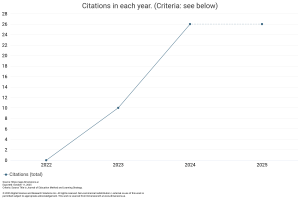Implementation of Problem-Based Learning to Develop Students Creative Thinking Ability
DOI:
https://doi.org/10.59653/jemls.v1i01.12Keywords:
problem-based learning, creative thinking, develop studentAbstract
This study aims to describe the application of problem-based learning to develop the creative thinking skills of PGSD. One of the advantages of the problem-based learning model is being able to train students in using the various concepts, principles, and skills they have learned to solve the problems they are facing. With the application of problem-based learning, the ability to think creatively can develop, because the creative thinking skills observed in this study are in the form of the ability to identify, analyze, solve problems, think logically, and make decisions correctly. Because the results of the verification process show that it is significant. There are many types of creative thinking-based learning models used to address educational problems, but one of the most effective is the problem-based learning model, which requires each child to have a unique set of beliefs and values. Complement one another, enabling teachers to think creatively for each student as they tackle a given problem.
Downloads
References
Allert, C., Dellkvist, H., Hjelm, M., & Andersson, E. K. (2022). Nursing students’ experiences of applying problem-based learning to train the core competence teamwork and collaboration: An interview study. Nursing Open, 9(1). https://doi.org/10.1002/nop2.1098
Aulia, L., & Budiarti, Y. (2022). Penerapan model pembelajaran problem based learning terhadap kemampuan pemecahan masalah. Journal of Elementary School Education, 2(1).
Bains, M., Kaliski, D. Z., & Goei, K. A. (2022). Effect of self-regulated learning and technology-enhanced activities on anatomy learning, engagement, and course outcomes in a problem-based learning program. Advances in Physiology Education, 46(2). https://doi.org/10.1152/advan.00039.2021
Dwi Ferdiani, R., Manuharawati, & Khabibah, S. (2022). Activist learners’ creative thinking processes in posing and solving geometry problem. European Journal of Educational Research, 11(1), 117–126. https://doi.org/10.12973/eu-jer.11.1.117
Kim, N. J., Vicentini, C. R., & Belland, B. R. (2022). Influence of Scaffolding on Information Literacy and Argumentation Skills in Virtual Field Trips and Problem-Based Learning for Scientific Problem Solving. International Journal of Science and Mathematics Education, 20(2). https://doi.org/10.1007/s10763-020-10145-y
Lonergan, R., Cumming, T. M., & O’Neill, S. C. (2022). Exploring the efficacy of problem-based learning in diverse secondary school classrooms: Characteristics and goals of problem-based learning. International Journal of Educational Research, 112. https://doi.org/10.1016/j.ijer.2022.101945
Lorenz, L., & Bush, E. (2022). Critical and Creative Thinking and Photovoice: Strategies for Strengthening Participation and Inclusion. Health Promotion Practice, 23(2). https://doi.org/10.1177/15248399211055714
Mursid, R., Saragih, A. H., & Hartono, R. (2022). The Effect of the Blended Project-based Learning Model and Creative Thinking Ability on Engineering Students’ Learning Outcomes. International Journal of Education in Mathematics, Science and Technology, 10(1), 218–235. https://doi.org/10.46328/ijemst.2244
Niu, W., Cheng, L., Duan, D., & Zhang, Q. (2022). Impact of Perceived Supportive Learning Environment on Mathematical Achievement: The Mediating Roles of Autonomous Self-Regulation and Creative Thinking. Frontiers in Psychology, 12. https://doi.org/10.3389/fpsyg.2021.781594
Rahyuningsih, S., Nurhusain, M., & Indrawati, N. (2022). Mathematical Creative Thinking Ability and Self-Efficacy: A Mixed-Methods Study involving Indonesian Students. Uniciencia, 36(1). https://doi.org/10.15359/ru.36-1.20
Schut, A., van Mechelen, M., Klapwijk, R. M., Gielen, M., & de Vries, M. J. (2022). Towards constructive design feedback dialogues: guiding peer and client feedback to stimulate children’s creative thinking. International Journal of Technology and Design Education, 32(1). https://doi.org/10.1007/s10798-020-09612-y
Setiyani, Waluya, S. B., Sukestiyarno, Y. L., & Cahyono, A. N. (2022). E-Module Design Using Kvisoft Flipbook Application Based on Mathematics Creative Thinking Ability for Junior High Schools. International Journal of Interactive Mobile Technologies, 16(4). https://doi.org/10.3991/ijim.v16i04.25329
Shofty, B., Gonen, T., Bergmann, E., Mayseless, N., Korn, A., Shamay-Tsoory, S., Grossman, R., Jalon, I., Kahn, I., & Ram, Z. (2022). The default network is causally linked to creative thinking. Molecular Psychiatry, 27(3). https://doi.org/10.1038/s41380-021-01403-8
Silva, H., Lopes, J., Dominguez, C., & Morais, E. (2022). Lecture, Cooperative Learning and Concept Mapping: Any Differences on Critical and Creative Thinking Development. International Journal of Instruction, 15(1), 765–780. https://doi.org/10.29333/iji.2022.15144a
Sousa, M. J., & Costa, J. M. (2022). Discovering Entrepreneurship Competencies through Problem‐Based Learning in Higher Education Students. Education Sciences, 12(3). https://doi.org/10.3390/educsci12030185
Sujono, I., Malaka, Z., Istifhama, L., Nasiri, N., & Anah, S. (2022). Efforts to Strengthen Islamic Moderation of Islamic Religious Universities in Indonesia. Proceedings of the 6th Batusangkar International Conference, BIC 2021, 11 - 12 October, 2021, Batusangkar-West Sumatra, Indonesia. https://doi.org/10.4108/eai.11-10-2021.2319459
Syafrial, Ashadi, Saputro, S., & Sarwanto. (2022). Trend creative thinking perception of students in learning natural science: Gender and domicile perspective. International Journal of Instruction, 15(1). https://doi.org/10.29333/iji.2022.15140a
Tong, L. C., Rosli, M. S., & Saleh, N. S. (2022). Enhancing HOTS using Problem-Based Learning and Digital Game in the Context of Malaysian Primary School. International Journal of Interactive Mobile Technologies, 16(2). https://doi.org/10.3991/ijim.v16i02.27677
Trullàs, J. C., Blay, C., Sarri, E., & Pujol, R. (2022). Effectiveness of problem-based learning methodology in undergraduate medical education: a scoping review. BMC Medical Education, 22(1). https://doi.org/10.1186/s12909-022-03154-8
Unger Madar, M., & BenDavid-Hadar, I. (2022). Does Home Schooling Improve Creative Thinking and Social Competencies among Children? Home Schooling in Israel. Journal of School Choice, 16(1). https://doi.org/10.1080/15582159.2021.1977584
Downloads
Published
How to Cite
Issue
Section
License
Copyright (c) 2023 Budi Utomo

This work is licensed under a Creative Commons Attribution-ShareAlike 4.0 International License.
Authors who publish with this journal agree to the following terms:
- Authors retain copyright and grant the journal right of first publication with the work simultaneously licensed under a Creative Commons Attribution-ShareAlike that allows others to share the work with an acknowledgement of the work's authorship and initial publication in this journal.
- Authors are able to enter into separate, additional contractual arrangements for the non-exclusive distribution of the journal's published version of the work (e.g., post it to an institutional repository or publish it in a book), with an acknowledgement of its initial publication in this journal.
- Authors are permitted and encouraged to post their work online (e.g., in institutional repositories or on their website) prior to and during the submission process, as it can lead to productive exchanges, as well as earlier and greater citation of published work (See The Effect of Open Access).
























